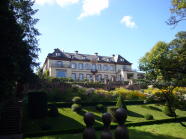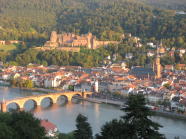General Outline of "Placing the Future"
The 20th symposium in the Klaus Tschira Symposia series on Knowledge and Space focuses on the challenges facing humans as we step into tomorrow. Uncertainty about the future is a key issue in defining the relationship between knowledge and space today. The institutionalization of science and the growth of education have paved the way for a post-industrial knowledge society, an innovation-based knowledge economy, and systemic trust in evidence-based policies. Yet these developments have also catalysed controversy over desired ways of living, who defines “progress” for the future, and how to even know the future in the face of unavoidable uncertainty. Controversies now swirl around how to tackle climate change, environmental sustainability, global pandemics, social inclusion, economic prosperity, and peaceful co-existence – and how to anticipate the many unforeseen issues sure to take shape in the coming decades.
The Knowledge and Space Symposia have focused on the dynamic relationship between knowledge and geography. This 20th symposium seeks to shed light on theoretical challenges, methodologies, and empirical findings regarding the interplay between knowledge, space, and the future. Knowledge is key to understanding the past, navigating the present, and anticipating the future. But as Friedrich Hayek reminds us, knowledge is not given to anyone in its totality. Human understanding requires social exchange, collective meaning-making, and interactive learning across thought collectives and communities. Geographical place and aspirational futures of variably-scaled communities are crucial for sparking new ideas, combining knowledge and creating innovation – all guided by and having real impacts on the future. On the one hand, collective decisions to invest and act towards the future transform places and regions as well as the relations between them. Yet on the other hand, the making of the future itself has a place. Places are crucial for where people meet to breed and spread visions of tomorrow and to mobilize shared commitment and resources to take action.
We invite scholars to explore these dynamics across disciplines, schools of thought, and geographic academic communities. The guiding questions for debate include, but are not limited to, two themes:
- Knowing the future. What is the state of research on the future, futures, and futurity? How does place influence the way that futures are known or defined? What is the role of knowledge in anticipating likely, imagining alternative, and creating desired futures? How does our understanding of the future shape our present behaviour? What does history tell us about how societies have previously looked and lived towards new futures? What futures are forgotten? What is the significance of popular culture (films, literature, science fiction) in the exploration of futures? And what methods do scholars use to predict, forecast and foresight development, as well as to envision desired states of life in the future?
- Placing the future. What are the geographies of researching, envisioning and making the future? What are the places where futures are actually conceived and created? To what extent are these places virtual or real, and does their materiality influence their reach across space and publics? Who are the actors involved in imagining and acting on potential futures? How do some actors – from politicians and financiers to environmental activists and social justice organizers – mobilize the future as a resource to achieve political or financial objectives? What narratives, strategies and social mechanisms do they employ to define and control – and sometimes colonize – the future(s) in certain places?
Guests
Although the symposium is not a public event, we cordially invite interested students and young researchers to attend. Graduate as well as postgraduate students can apply for a limited number of travel grants (up to 300€). To apply, please send an e-mail to Klara Jungkunz (klara.jungkunz@stud.uni-heidelberg.de) including your name, affiliation and a brief statement of your motivation in which you may explain how the symposium relates to your own research. The number of participants must be limited due to the current corona regulations and to allow for intensive exchange.
Contact and registration
Klara Jungkunz
E-mail: klara.jungkunz@stud.uni-heidelberg.de
Symposia on “Knowledge and Space”
Book series “Knowledge and Space”





